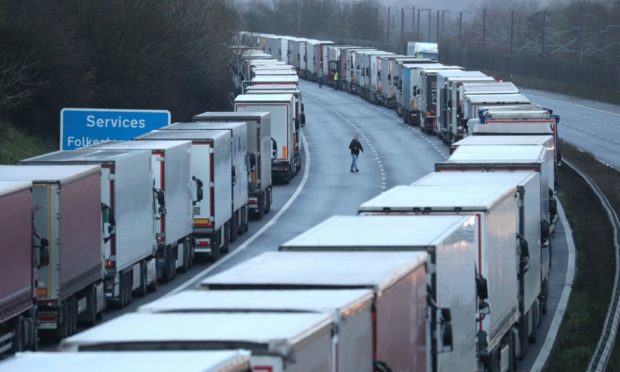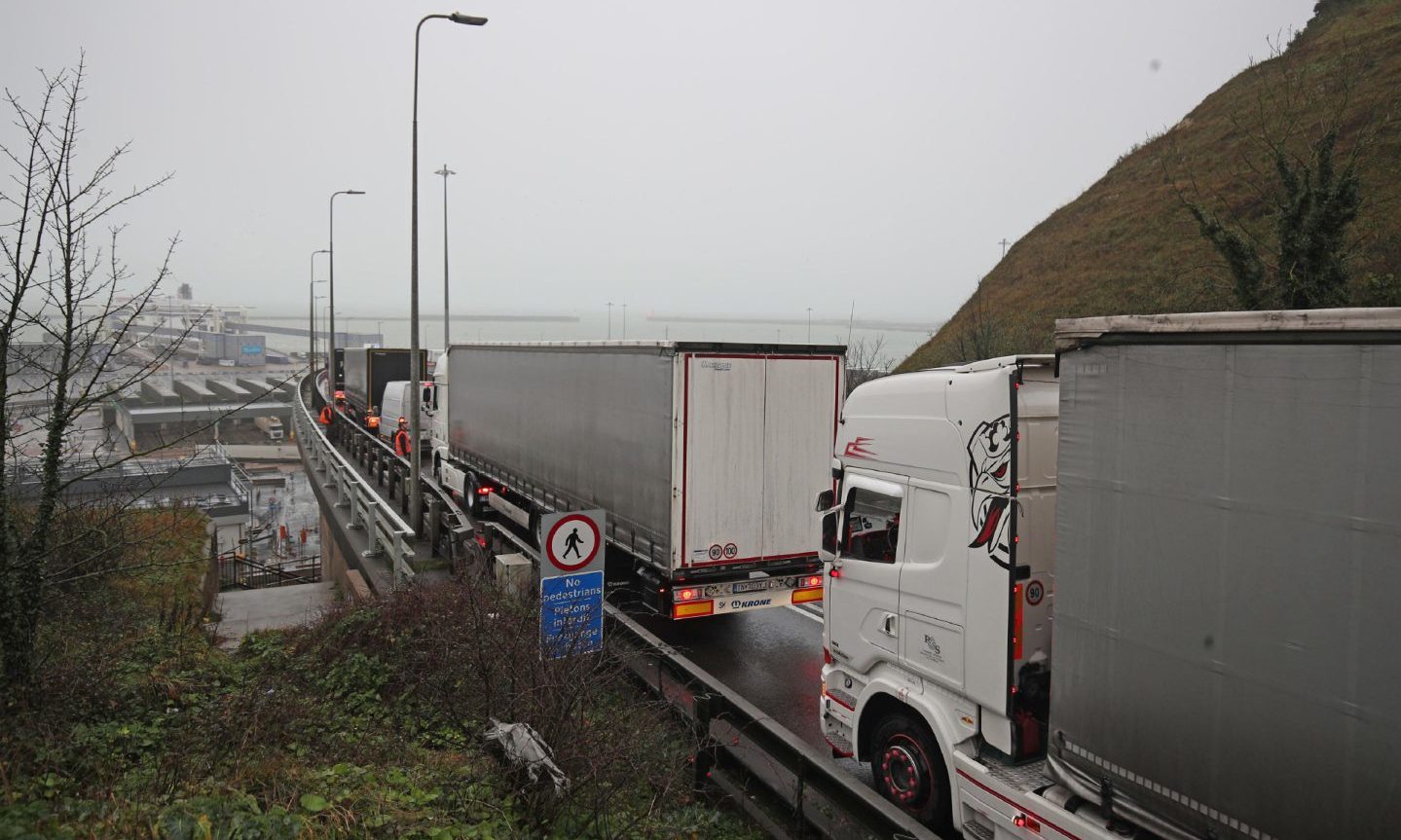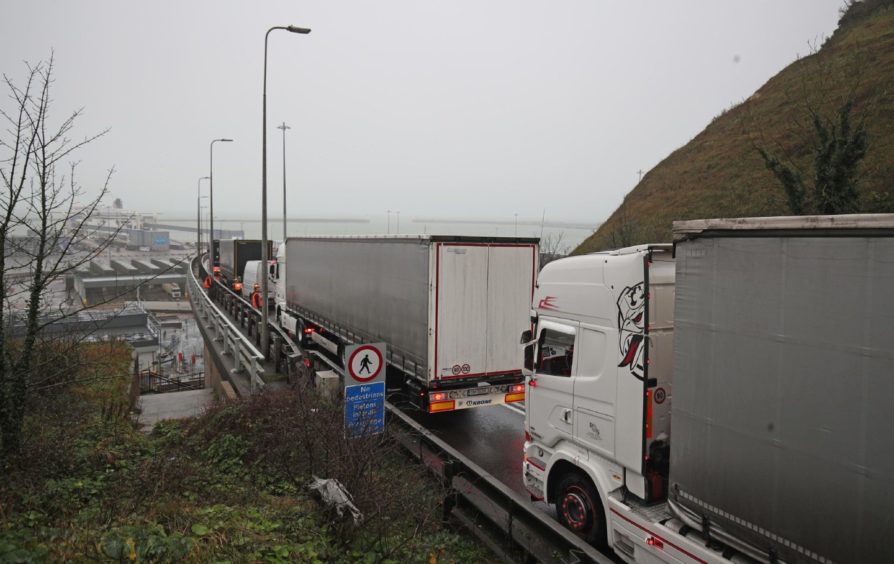The First Minister has joined Scottish food leaders in calling for perishable goods to be prioritised at ports following a deal with France to get freight moving again.
Nicola Sturgeon and the chief executives of Scotland Food and Drink and Food and Drink Federation Scotland urged the UK government to ensure seafood can be first in line to cross the Channel in order to get to market before it is spoiled.
It is feared millions of pounds worth of seafood and other perishable produce could go to waste after being stuck in huge queues of lorries in Kent waiting for the French border to reopen having been closed to the UK for 48 hours.
The border shut on Sunday following news of a new coronavirus variant in the UK, however France has now reopened its borders to those who test negative for Covid-19. The British army is being deployed to help test lorry drivers from this morning, but it is said this operation may take days to complete with thousands of tests needing to be carried out.
Nicola Sturgeon took to Twitter to highlight that seafood will be one of her main priorities in getting across the Channel.
I agree with @scotfoodjames. We still await detail of the agreement, but if freight starts moving tomorrow – as we must hope it will – the plan to prioritise perishable produce such as seafood should be activated immediately. https://t.co/tfDmQHHrpz
— Nicola Sturgeon (@NicolaSturgeon) December 22, 2020
Urgency
James Withers, chief executive of Scotland Food and Drink, also took to the social media channel to keep businesses and the public up-to-date on what is happening, and outlined how quickly the industry needs to see results in a series of Tweets.
FREIGHT UPDATE, Wednesday, 1pm
Good meeting with @FergusEwingMSP @SeafoodScotland @SSPOsays earlier.
Today’s top priorities (thread):
1. UKGov must confirm the start of its prioritisation plan for perishables. @michaelgove said there was a plan for disruption. So activate it. pic.twitter.com/z4T2isKAmX— James Withers (@scotfoodjames) December 23, 2020
Today’s priorities continued:
2. Exploring testing facility for drivers in Scotland. Why? Would reduce demand in South East, could fast-track lorries at English ports & avoid wasted journeys if a driver was +ve
3. Formal request to UKGov for emergency financial aid for losses— James Withers (@scotfoodjames) December 23, 2020
Turning to the UK market
Jamie Mcmillan, owner of Loch Fyne Langoustines and Loch Fyne Seafarms, was one of the Scottish seafood producers caught up in the border crisis.
Stuck in the Dover port queues, he turned his lorry around and drove back to Scotland with his £90,000 stock to try and salvage as much of it as he could.
Out delivering his produce at 2.30am this morning, Jamie took to Twitter to share his frustrations in not getting access to the European market quick enough.
He said: “I’m on the road today delivering myself. It is 2.30am in the morning and there’s still no access to the EU market.
“We’ve got a trailer full of product that we can’t sell so we’re going to try and push stuff into our UK customers this morning. I’d like to thank all of my UK customers for their support all year, without them it would be even more difficult this year.
“We’ve got a chill full of product that we can’t get to the EU market so my job today is to try and get most of it, or as much as we can into the UK market.”
Good morning all , on the road today to try and sell our products, still no access to the EU market , too late now ,so dispatching to our UK customers to try and clear some stock @scotfoodjames @SeafoodScotland @FergusEwingMSP @Feorlean @scotgov @CFAScot @CIFA_Scot pic.twitter.com/TZ4JEGNEZr
— Lochfyne langoustines Ltd & Lochfyne seafarms Ltd (@LochfyneLangous) December 23, 2020
Limited timescale
According to Clare MacDougall, head of trade marketing at Seafood Scotland, it is primarily live shellfish and fresh salmon producers that are being affected by the border crisis.
She said: “Most of the product which is being affected by this is live shellfish and fresh salmon. The live shellfish can’t go into cold storage and if it doesn’t get through the borders it will have to come back and be spoiled. My understanding from the salmon companies is that they are just going to come back and try sell in the UK.
“Speaking to different companies some are taking different approaches. Some are trying to get the product over the borders but there’s such a limited timescale to do that, so others are turning the lorries around and bringing it back.”
“If your lorry is still blocked it’s not getting to Spain by Christmas”
David Thomson of the Food and Drink Federation Scotland said on BBC Radio Scotland this morning that the deal has come “far too late” for many businesses delivering perishable goods to European countries and warned some may go to the wall.
He said: “For those people who export fresh and perishable goods and particularly seafood and salmon in Scotland it’s been an absolutely disastrous few days and it will lead to a black Christmas for many of those businesses.
“The deal will be far too late for many people who are delivering perishable goods to the Continent. It’s too late now to get to customers before Christmas. In particular, seafood in Spain is a very important thing on Christmas Eve and if your lorry is still blocked it’s not getting to Spain by Christmas.
“The hauliers say there are around 4,000 to 5,000 lorries backed up. We would reckon it’s going to take days before this is unblocked fully and in that time trade is not going to flow in the way we would expect it to do. Orders are not going to be placed until people can be sure they can get those orders so there is going to be a continuing backlog over the next few days and probably well into next week.
“We’ve heard of companies saying this is the final straw for them and they will not be able to deal with the losses. People have to pay farmers and fishermen, people have to deal with the customers they’ve let down and they would not make the money they would do on what is the most lucrative days of the year for most food businesses, so many many businesses are going to have a very difficult few days trying to work out if they can continue.”
With little more than a week left until the UK exits the European Union, he said unravelling the chaos at the ports to allow lorries carrying seafood through would be ‘the first test’ in seeing whether the UK government can action plans it says are in place for Brexit.
“We are concerned and we’ve been concerned for a very long time. For example, we were told that seafood would be prioritised if there were any issues at the border and really the first thing the UK government has to do today is to ensure that any seafood that is still able to go across is prioritised and taken to the border. That will be the first test of the plans that the UK government said were in place to ensure there would be no blockages at the border come Brexit. So let’s see if they pass that test.”


